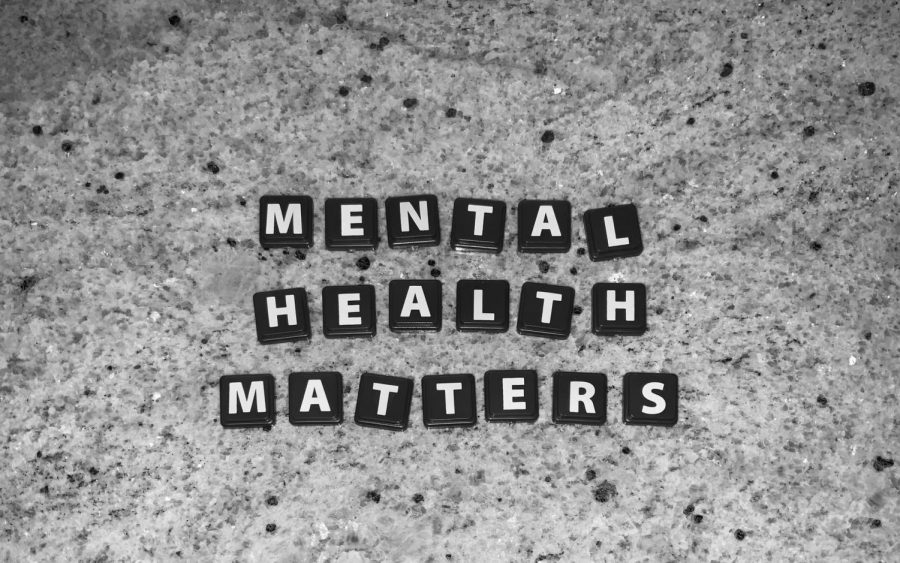The Hidden Pandemic: Mental Health
The school year of 2020-2021 has been a difficult one. Classes have been strictly online for the majority of the year, leaving many students isolated from peers. This can take — and has taken — a toll on the mental health of students.
The Crimson staff sent out an anonymous survey concerning mental health in quarantine and student’s opinions on the school’s handling of mental health issues. We received 63 responses, consisting of 22 freshmen, 17 sophomores, 12 juniors, and 12 seniors.
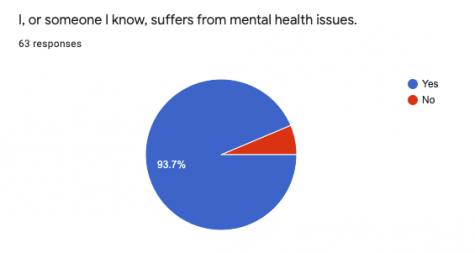
When asked if they, or someone they know, suffers from mental health issues, 93.7 percent of students who responded answered yes. On top of this, 31.7 percent of students said that they did not have an adult in their lives who they trust and feel comfortable talking to about their mental health, while 46 percent said yes and 22.2 percent said they were unsure. However, when asked if they have a friend they feel comfortable talking to about their mental health, 77.8 percent said yes.
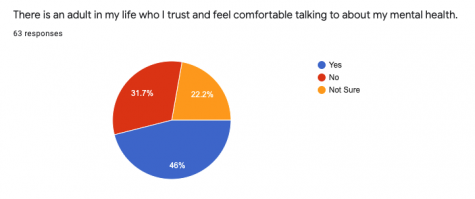
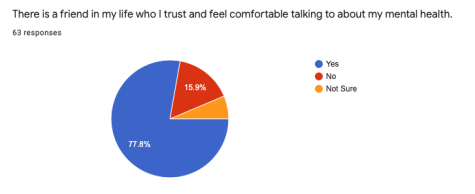
Quarantine and zoom classes— and all of their effects— have led to worsening mental health conditions for many students. 60.3 percent of responses said that their mental health got worse over quarantine. Additionally, 57.1 percent of students said that zoom classes had a negative effect on their mental health. One student responded by saying that they “have no relationships outside of [their] family anymore.” Another student said that “Zoom classes have taken a wrecking ball to [their] focus and overall mental state.”
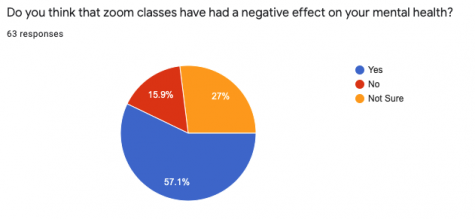
Several students mentioned the stress from turning their cameras on for zoom classes. “It’s very anxiety-inducing to be asked to turn my camera on since people are then able to see my room, which is really my own private space […] it’s even worse being asked to speak on the mic, as I’m constantly worried that my mic might not work and that I’ll be marked down for not speaking,” one student responded.
“It’s always cameras. I understand obviously that it sucks for teachers to teach to blank screens but forcing us to have them on is also not the best option. Unfortunately, although teachers really don’t care what we look like, it really affects students’ self-confidence/mood when we have to keep them on, especially if we’re just having a bad day or just not in the mood to get ready,” another student answered.
Students also expressed that they felt the school doesn’t easily allow for time to take care of their mental health. 66.7 percent of students felt that the school and teachers did not accommodate mental health days. “I don’t know a single person who is struggling with mental health that is comfortable telling their teachers that they need a “mental health day” especially since many of them struggle with some form of social anxiety as well and are even scared to message teachers for sick days or if they have a question in the course content,” one student responded.
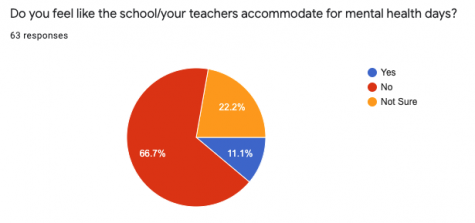
“I think that there is so much pressure put on doing the absolute best you can do in everything academic related, and even when they say ‘do your best,’ your best is not enough, so there is no time to simply rest and do what you enjoy or figure out what you enjoy,” another student said.
Several students also mentioned the stress that comes with large amounts of work assigned to them. “There’s just so much work, it’s impossible to take a day off without getting several days or even weeks behind,” one student said.
“Teachers seem to load all the hard work, lots of work, and or tests in the same span of days. Also, we are expected to do 50 minutes of class, plus almost an hour of homework, plus extracurriculars, not to mention the stress of squeezing in time for friends, family, and relaxation. If teachers could just realize that every few weeks, we the students need a light week where we can relax a bit and collect ourselves, that would be great,” another student said.
Students also expressed that they felt that the leadership staff at CAHS did not understand and meet the mental health needs of students, with 47.6 percent saying no.
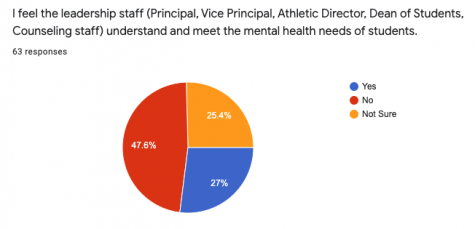
These are some responses from students about how the leadership staff handles student mental health:
“I just know that the current methods… don’t make sense. I don’t know what they’re meant to achieve. Are they to spread understanding? Advise kids with mental problems to seek help? Do any of these videos affect the people who watch them, or are they just shrugged off?”
“I think it’s actually just difficult for adults of a different generation to try and put themselves into the shoes of the young teenagers currently in high school, but in order to improve I think a big thing is to be sympathetic and understanding but not pitying to those struggling with mental health.”
“I don’t think it’s their fault but the school system is so rigid that I know many people who are struggling mentally and desperately need a break but are terrified to do so because that would just be pushing work back and make it much harder to get caught up.”
“Though I do feel like there are plenty of teachers who are willing to help you out personally, of which I am very grateful for, the higher-up staff seems to have created some stigma, and/or dogmatized it. For example ‘Wellness Wednesday’ … feels increasingly patronizing. I feel like the school tries to press into our lives and issues rather than being invited in, and if your mental health is affecting your schoolwork they are more focused on ‘fixing’ you, rather than actually letting you take the time to actually come to grips and process your feelings and or emotions.”
“I have been struggling to get my work done due to a really bad depressive state the past couple months and have reached out to my teachers as to why I have missing assignments and at first they come off as really open, but forget really fast.”
“I think that students have a lot more going on than meets the eye, so a lot of students feel that their issues are often ignored/looked past because it doesn’t seem that bad when in reality there’s a lot deeper things going on.”
“I have heard countless reports from people who have gone to see the counselors and they have not helped them or met the mental health needs of students. While there have been new series on mental health and the issues in our society each month, the in-person meetings that were happening prior to covid were not doing enough, and people I talked to felt like the school counselors were not doing their best to help students.”
“For me personally, I would say promoting awareness of topics has been covered, but I don’t know how trained the counselors are/were for actually applying the help that students struggling with these issues need.”
Students were asked about what they wanted to see the school do to better meet the mental health needs of the students:
“Be more accommodating to ALL students, not just ones that you know have mental health issues because the ones that haven’t spoken about it are often the ones in the worst mental states,”
“I’d like them to understand that many people who are truly struggling will not be comfortable telling you and that it is NOT their fault for being unable to ‘reach out.’ “
“Talk more about the issues instead of pretending like they aren’t a big deal. People don’t take things such as anxiety or depression seriously until something bad happens, and I think it should be a discussion before then.”
“In order to support mental health issues, I would like them to take more steps to understand them. Not only on a psychology level, with research and other stuff like that, but also on a human level. Nobody can support something that they can’t understand. Research mental health issues, but don’t forget that every person is different, and therefore will cope and react to these mental health issues differently.”
“There needs to be an understanding that LGBTQ+ students cannot and should not be outed to possible unsupportive parents. They need a safe space just as much as their non-LGBTQ+ peers, and they should be able to talk to a counselor without having to worry about being outed.”
“The counselors should be able to recommend students to trained mental health professionals (therapists and all that) and should be able to talk to parents who are reluctant to allow their kids to see a therapist to explain why it would help their child.”
For students looking for peer support for their mental health, one of the clubs, Ataraxia, focuses on discussing mental health issues. “Ataraxia, the actual definition of it means the freedom of anxiety from the mind, and just peacefulness, and that’s ultimately our goal in life, just to feel peaceful in our mind, our body and our soul,” president of Ataraxia, sophomore Melody Reyes said.
“To me it’s all about observation, I know that a lot of mental illnesses, they’re usually dealt with very quietly and very personally, and yes it’s hard to see the signs, but to me they’re always there, and it’s something that we can all do together because yes, people need to speak up so we can help them, but that’s hard and we need to be able to go and just be a nice smile and a shoulder to cry on,” Reyes said.
For students concerned about counselors not being able to relate to the issues of students, Ataraxia can serve as a source of peer support. “I understand the concern of ‘maybe they won’t be able to relate to my issues,’ and you know age difference is kind of tricky, and there’s other resources to help with that and I’m more than willing to share about those resources,” Reyes said. “With Ataraxia, you know we’re all around the same age, … so yeah peer support is very important and you know sometimes it’s hard to go to a personal friend, you just kind of want to see a new face and it’s easier to talk that way.”
“We talk about a lot of different coping mechanism skills and we share you know, oh maybe something I like could work for you, and then we all come together and we just check in on each other and talk, and sometimes when we don’t feel like concentrating on a big topic, we just talk and we talk about our weeks, we talk about our days, we talk about our anxieties, what stresses us out, if we’ve had a good day, if we’ve had a bad day, and everything in between,” Reyes said.
“This next school year is really important, there’s seniors that are leaving that didn’t have a typical senior year, there’s freshman that are entering their sophomore year after not having a typical freshman year, and then there’s people like me, sophomores who are entering junior year where things are getting closer to graduating and maybe a little more more getting anxious about plans after high school, so with that I definitely want to … just come together,” Reyes said.
You can get in contact with Ataraxia via their Instagram: @cahs.ataraxia.
If you need help with your mental health, here are hotlines available to help you.
National Suicide Hotline: 800-273-8255 (call or text)
Trevor Project: 1-866-488-7386 (call) Text START to 678-678. (text)


